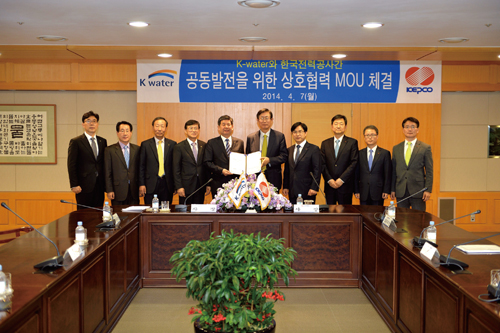MOU signed to integrate remote reading, overseas projects, etc.

K-water President Choi Gye-woon and KEPCO President Cho Hwan-eik hold
the certificate of an MOU on the integration of the remote reading of tap
water and electricity, overseas projects, education, and other areas of mutual
concern for technology cooperation after they signed the deal at the
K-water Seoul Metropolitan Headquarters in Gwacheon, Gyeonggi-do, on April 7.
(photo: courtesy of K-water)
The remote reading of tap water and electricity amounts used by each household per month will be integrated some day soon, removing inconveniences the general public experience and offering better services.
Korea Water Resources Corp. (K-water) and Korea Electric Power Corp. (KEPCO) signed an MOU on the integration of the remote reading of tap water and electricity, overseas projects, education, and other areas of mutual concern for technology coo-peration at the K-water Seoul Metropolitan Headquarters in Gwacheon, Gyeonggi-do, on April 7.
Under the agreement, the two public entities will closely collaborate in overall areas of water and electricity to provide better services to the general public by tearing down partitions between the two companies in line with the government’s 3.0 policies of public openess.
The deal calls for the integrating of the remote reading of tap water and electricity meters via power line communication channels; sharing information concerning overseas hydroelectric power projects; conducting joint ventures and joint studies into future technologies such as new and renewable energies; improving the landscape of power transmission towers along Sihwa Lake; and the boosting of exchanges in the educational field.
K-water President Choi Gye-woon said, “The agreement takes on significance owing to the collaboration between the two public entities, each representing the nation’s water and energy fields. We’re going to form a working-level consultation committee and regularize meetings, and we’ll do our utmost to offer quality services through collaboration between the two corporations to the extent people can sense the changes.”
KEPCO President Cho Hwan-eik said, “The signing of the MOU will enable the two public entities to closely cooperate in carrying out their duties. We’ll greatly contribute to improving the public welfare by cooperating mutually and implementing joint projects down the road.”
K-water Works on Pilot Project to Turn Paju City into ‘Smart Water City’
K-water has reached an agreement with the Paju Municipal Government to launch a pilot project to turn the Gyoha and Jeokseong development areas into a “Smart Water City.”
Under the agreement, signed at the Paju City Hall on April 9, the two institutions will make joint efforts for the supply of “healthy” tap water in a wide range of work, ranging from measuring the water quality of pipelines and equalizing residual chlorine, to online faucet water quality checks and endoscopic inspections for indoor pipelines and the diagnosing of water tanks.
Paju Mayor Lee In-jae said, “Paju is a happy city that coexists with advanced industries and sophisticated culture. If top-rated tap water to improve the health of Paju citizens is supplied under the Smart Water City Project, Paju cannot be better.”
K-water President Choi Gye-woon said, “The supply of healthy tap water tailored to meet public demand will raise Paju citizens’ happiness and public trust over tap water, and Paju will be the subject of envy from all people due to the pilot Smart Water City project.” He continued, “I’m sure that the successful implementation of the pilot project will bring about dramatic improvements in the tap water supply system.”
Meanwhile, K-water said the problem is that the public acceptance of tap water is low despite diverse efforts to introduce advanced water treatment facilities and check into 250 kinds of water quality items.
K-water now implement diverse steps to supply tap water conducive to the public health to the faucet, including the stabilizing of raw water collection, the introduction of advanced water treatment facilities tailored to meet public demand, and the strengthening of the examination of the water supply.
